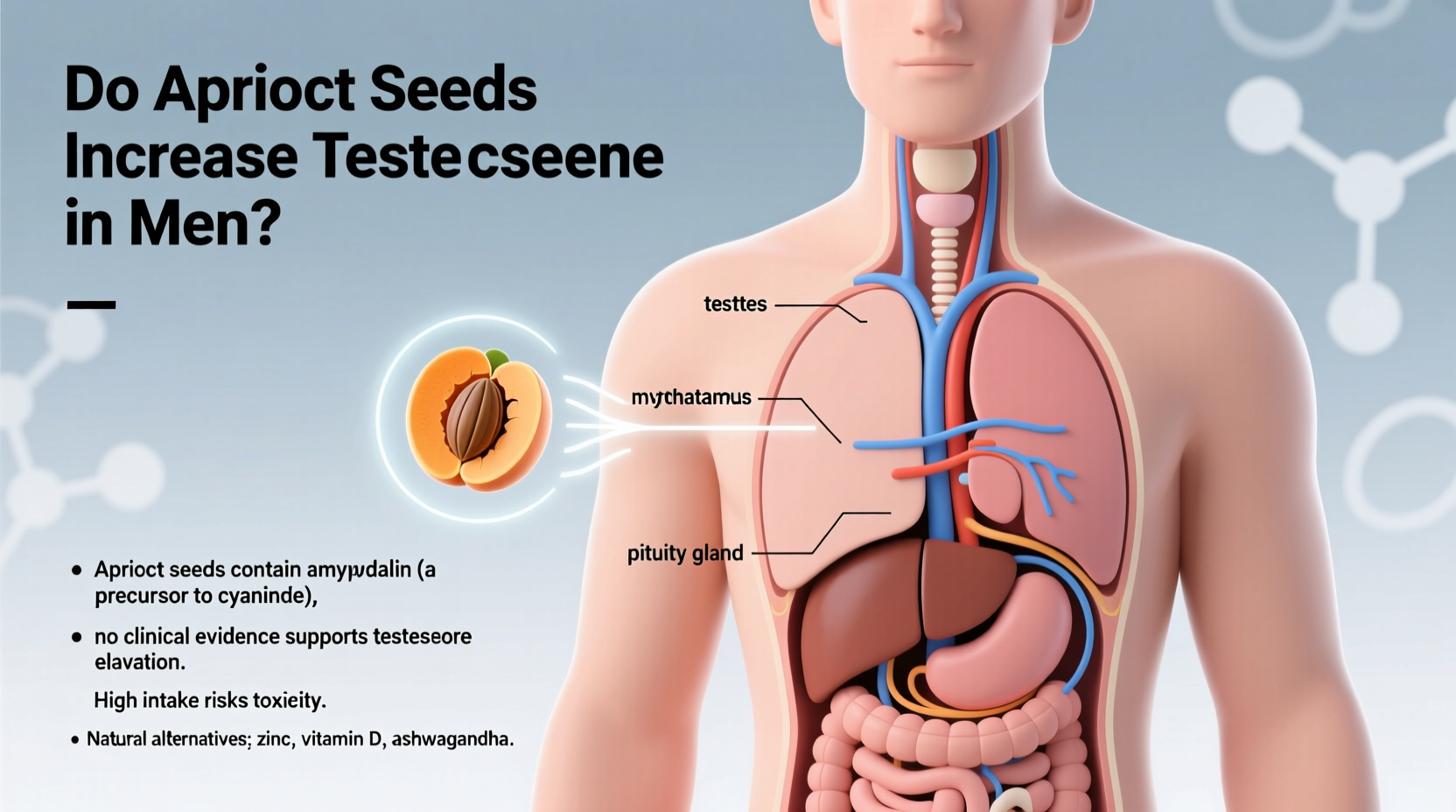Understanding the Apricot Seed Testosterone Myth
Many men searching for natural ways to boost testosterone encounter claims about apricot seeds. These assertions often circulate through alternative health websites and social media, suggesting that consuming apricot seeds—particularly the bitter variety—can naturally elevate testosterone levels. But what does scientific evidence actually say?
What Are Apricot Seeds and Why the Testosterone Connection?
Apricot seeds, found inside the stone of apricot fruits, contain a compound called amygdalin (sometimes marketed as "vitamin B17" or laetrile). Proponents of apricot seeds for testosterone enhancement typically claim that amygdalin:
- Stimulates hormone production pathways
- Contains nutrients essential for testosterone synthesis
- Supports overall endocrine system function
However, these claims lack scientific validation. The European Food Safety Authority (EFSA) has explicitly stated that no evidence supports health benefits from amygdalin consumption, while confirming significant cyanide exposure risks.

Scientific Evidence: Claims vs Reality
| Common Claim | Scientific Evidence | Source Assessment |
|---|---|---|
| "Apricot seeds boost testosterone production" | No clinical studies demonstrate this effect in humans | Unsupported claim |
| "Amygdalin supports male hormone health" | Amygdalin breaks down into cyanide, which can damage endocrine function | Contradicted by evidence |
| "Natural source of testosterone-boosting nutrients" | Nutrient profile doesn't significantly differ from other seeds | Exaggerated claim |
Documented Timeline of Apricot Seed Safety Concerns
The history of apricot seed consumption reveals a pattern of emerging safety concerns:
- 1950s: Laetrile (processed amygdalin) promoted as cancer treatment despite lacking evidence
- 1970s-1980s: Multiple cases of cyanide poisoning reported from apricot seed consumption
- 2016: EFSA establishes maximum safe consumption levels due to cyanide risk
- 2020: FDA issues warning about apricot kernel products and cyanide poisoning
- 2023: European Commission sets strict labeling requirements for apricot kernels
Actual Risks of Apricot Seed Consumption
While the testosterone connection is unfounded, the dangers are very real. When consumed, amygdalin breaks down into hydrogen cyanide—a potent toxin. The U.S. Food and Drug Administration warns that even small amounts can cause:
- Nausea and dizziness
- Headaches and confusion
- Drop in blood pressure
- In severe cases: respiratory failure and death
The EFSA determined that adults should not consume more than:
- 1-2 small apricot kernels daily
- Children should avoid them completely
Proven Approaches to Support Healthy Testosterone Levels
Instead of risking cyanide exposure with unproven remedies, consider evidence-based approaches supported by medical research:
Lifestyle Modifications with Scientific Backing
- Strength training: Multiple studies show resistance exercise increases testosterone temporarily and supports long-term hormonal health
- Sleep optimization: Research confirms men who get less than 5 hours of sleep have significantly lower testosterone levels
- Stress management: Chronic cortisol elevation directly suppresses testosterone production
Nutritional Approaches Supported by Research
Unlike apricot seeds, these dietary factors have documented connections to testosterone health:
- Adequate zinc intake (found in oysters, beef, pumpkin seeds)
- Sufficient vitamin D levels (sun exposure or supplementation)
- Moderate healthy fat consumption (avocados, olive oil, nuts)
When to Consult a Healthcare Professional
If you're concerned about low testosterone, consult a physician rather than experimenting with unproven remedies. Symptoms of clinically low testosterone include:
- Persistent fatigue despite adequate sleep
- Decreased sex drive
- Mood changes and difficulty concentrating
- Unexplained muscle loss
Medical professionals can provide proper diagnosis through blood tests and recommend evidence-based treatments when necessary.
Conclusion: Separating Fact from Fiction in Testosterone Support
The claim that apricot seeds increase testosterone in men represents a persistent health myth without scientific foundation. While the search for natural testosterone support is understandable, prioritizing safety and evidence-based approaches remains crucial. Documented risks of cyanide poisoning from apricot seeds significantly outweigh any theoretical benefits—which current research doesn't support anyway.
For men seeking to optimize testosterone levels, proven lifestyle interventions, proper nutrition, and medical consultation provide safer, more effective pathways than unverified natural remedies like apricot seeds.











 浙公网安备
33010002000092号
浙公网安备
33010002000092号 浙B2-20120091-4
浙B2-20120091-4